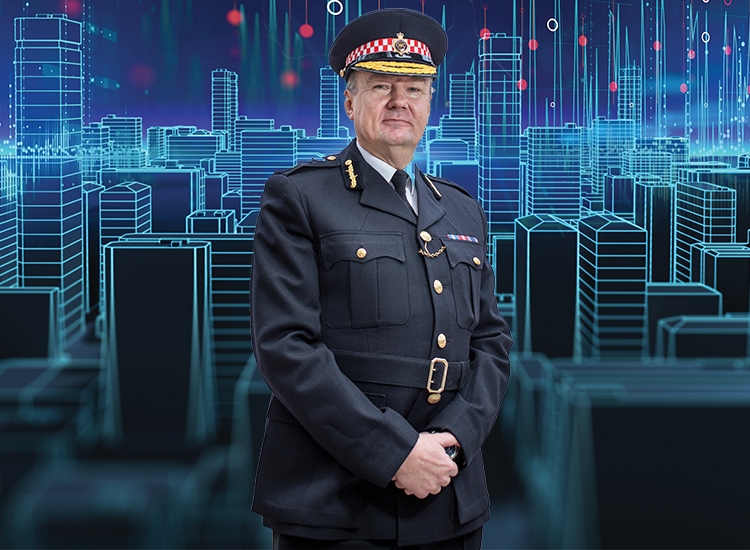Farewell to the City and a look ahead to the future of policing
 Following a distinguished career in policing spanning almost 40 years, Commissioner Ian Dyson, of the City of London Police, retired on 2nd January 2022. Here, he reflects on his experiences, and what lies ahead for policing in the UK.
Following a distinguished career in policing spanning almost 40 years, Commissioner Ian Dyson, of the City of London Police, retired on 2nd January 2022. Here, he reflects on his experiences, and what lies ahead for policing in the UK.
I think the UK police service has much to be proud of, and also, many challenges ahead. One of UK policing’s strengths is its response to terrorism. The Manchester Arena Inquiry, which is investigating the deaths of the victims of the 2017 Manchester Arena attack, will report on some areas where improvements can be made. However, other events of recent years have shown, in my view, how UK law enforcement protects its citizens from a threat that has grown in scale and complexity.
I also believe UK policing’s approach to managing its responsibilities during the COVID-19 pandemic is a mark of how we operate well in a devolved framework.
Frequently changing regulation and legislation, often at odds with existing legislation, was managed with respect for the citizen. ‘The 4 Es’ approach – where officers work systematically to engage, explain, encourage, and then, as a last resort, enforce – contrasts with enforcement techniques elsewhere in the world, but has proven successful here. That said, challenges remain.
I was appalled, like the rest of the police service, by the murder of Sarah Everard, and the subsequent conviction of Wayne Couzens – a serving police officer. It will take time to rebuild some people’s trust, which has been damaged by this abuse of power and authority.
The way we carry out police work has changed a great deal since the start of my career, and this has primarily been due to people moving much of their lives online. Cyber crime is one of the fastest growing criminal activities across the world, and it affects individuals and businesses. Cyber criminals seek to exploit human or security vulnerabilities in order to steal passwords, data or money. We have seen a sharp increase in this type of crime during the COVID-19 pandemic, as people have spent more time online.
The landscape and intelligence picture has evolved rapidly, highlighting the need to hire individuals who have the skills to continuously adapt in order to outsmart offenders. This has meant an overhaul of traditional methods of recruitment. In some ways, this has made UK policing more inclusive. Stereotypes surrounding the traditional ‘bobby on the beat’ are no longer relevant, as we aim to appeal to a wider demographic of abilities and backgrounds to strengthen our portfolio of skills.
Working with the private sector is also vital. In the world of counter terrorism, the partnership model has been strong and enduring over many years, and the depth of working now is truly impressive. When we talk about fraud, cyber crime and some of the other challenges facing the police, many of the skills, and much of the data we need, can be found outside our organisation. At any one time, the City of London Police has around 30 people seconded in from different sectors, enhancing our existing workforce and enabling valuable knowledge-sharing.
Policing now is more accountable, more dispersed (in both the online and the real world), more diverse, and more open to scrutiny than 40 years ago. Uniforms have changed beyond recognition, opinion on policy is more challenging and more readily shared, and the public care far more now than they did before about how we police, as well as what we do. But police officers’ ambitions, in my view, remain constant and have changed little: protect the vulnerable; confront the unsociable and unlawful; and lock up the bad people. I am hugely proud to have been a part of it.
Commissioner Ian Dyson, City of London Police
Commissioner Dyson’s career highlights
- Commissioner Dyson started his career in the Metropolitan Police Service in 1983.
- He spent time in many areas of the service, including crime and drug squads, vice and strategic planning.
- He spent 20 years as a public order commander, working in the command team of most major events in London.
- He moved to Surrey Police as Assistant Chief Constable in June 2008, overseeing some of the highest public confidence levels in the country and improving neighbourhood policing.
- In September 2010, he joined the City of London Police as a Commander and, two years later, was promoted to Assistant Commissioner. His portfolio of responsibilities included leading on Professional Standards and Equality, Diversity and Human Rights.
- He led the national roll-out of the 101 non-emergency number, and has overseen the City of London Police’s role as the National Lead Force for fraud and economic crime and, more recently, cyber crime.
- Promoted to Commissioner in 2016, he has led the City of London Police through a number of high profile major incidents, including terrorist attacks, large-scale protests and, most recently, the COVID-19 pandemic.
- He was awarded the Queen’s Police Medal for distinguished service in the 2016 New Year Honours.
See more articles on City of Police, in particular see New Chief Officer team at the City of London Police and The impact of Wayne Couzens on Policing by Consent in the UK.



